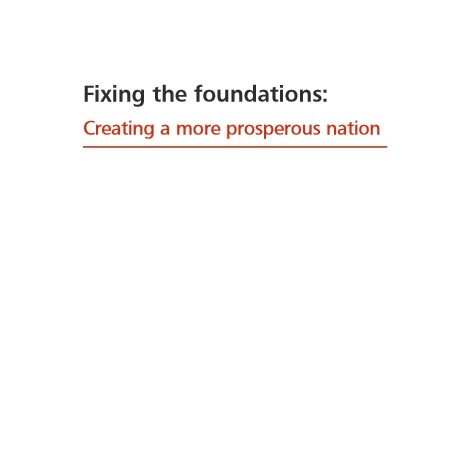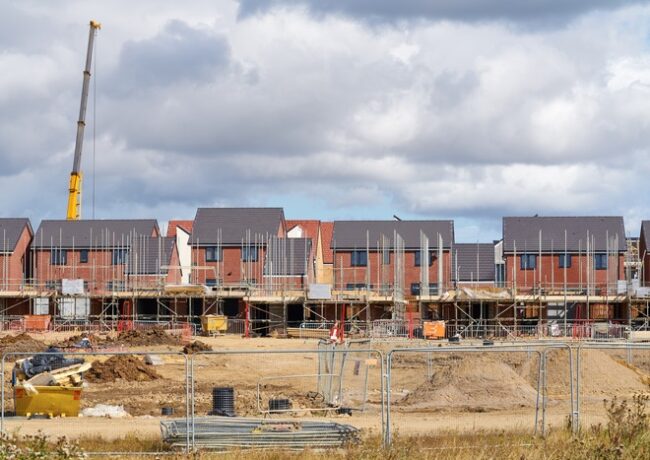Osborne announces major planning overhaul
The Chancellor of the Exchequer George Osborne has announced a raft of changes to the planning system, including Government intervention on delayed local plans, stronger compulsory purchase powers, and automatic planning permission for brownfield sites.
The changes are outlined in a 90-page report, ‘Fixing the Foundations: Creating a More Prosperous Nation’, written by Jim O’Neill, Manchester economist and recently appointed commercial secretary to the Treasury.
The blueprint includes:
- Powers for the Government to intervene and have local plans drafted setting out how housing needs will be met when local authorities fail to produce them
- A new zonal system which will give automatic planning permission on all suitable brownfield sites
- Penalties for local authorities that make 50% or fewer planning decisions on time
- Stronger compulsory purchase powers to bring forward more brownfield land, and devolution of planning powers to the Mayors of London and Manchester
- The right for major infrastructure projects which include elements of housing development to be fast-tracked through the Nationally Significant Infrastructure Regime
- The end to the need for planning permission for upwards extensions for a limited number of storeys up to the height of the adjoining building in London
- The requirement for higher-density development around key commuter hubs
- Extending Right-to-Buy to housing association tenants and to deliver 200,000 starter homes
- A major package to support SME housebuilders, including new sanctions for local authorities not processing smaller planning applications on time, with earlier fee refunds
In a statement ahead of the release of the report, Osborne said: “Britain has been incapable of building enough homes. The reforms we made to the planning system in the last parliament have started to improve the situation: planning permissions and housing starts are at a seven-year high.
“But we need to go further and I am not prepared to stand by when people who want to get on the housing ladder can’t do so. We’ll keep on protecting the green belt, but these latest planning reforms are a vital part of a comprehensive plan to confront the challenge of our lifetime and raise productivity and living standards.
“This will not be achieved overnight and will require a truly national effort by government, business and working people. But with this productivity plan, I believe that we have taken the vital first step towards securing the prosperity and a livelihoods of generations to come.
“It is my ambition that by 2030, Britain becomes the richest of all major economies.”
Responding to the announcement, Dan Mitchell, Manchester partner of Barton Willmore, said: “The continued focus on the redevelopment of brownfield land is of course welcomed, especially for residential uses. They can indeed provide a valuable contribution to meeting housing needs but will not solve our housing crisis alone. The constraint on bring forward development on brownfield site isn’t necessarily the planning system, it is also viability. The planning system is in place to balance all views and considerations in the public interest, the local character of places and individual brownfield sites can vary considerably and the planning system needs to take that wider viewpoint – obviously a block of apartments on a City Centre brownfield site will not be appropriate on suburban brownfield sites. Whilst also we must not forget that brownfield sites not already in residential usage are often providing the jobs and infrastructure that make our cities work.
“It will be interesting to understand any new rules as to how a deemed approval deals with those aspects of development. Clearly parameters will need to be set for any automatic deemed consents and as ever, the detail of today’s announcement will need to be scrutinised. The UK planning systems needs to provide a broad mechanism for stimulating all parts of the residential development industry. This needs to include provisions to enable both brownfield and greenfield land to come forward, mechanisms and a willingness for the appropriate reviews of the Green Belt land which is constraining the growth of our cities and towns which are at bursting point, and provisions to enable improved delivery of family homes, elderly and student accommodation, as well as the private rented sector model.
“The use of brownfield land in the North might prove challenging as there are many places where brownfield sites lie vacant, but where the local housing market cannot support development, intervention and funding availability is therefore a key issue.”
To view ‘Fixing the Foundations: Creating a Prosperous Nation’ click here





“The constraint on bring forward development on brownfield site isn’t necessarily the planning system, it is also viability.” absolutely spot on, in my experience. Also, Osborne is hardly going after nimbi’s if he’s intent on protecting Green Belt at all costs. I can see that these proposals were written by a ‘dismal science’ economist rather than anyone with any feeling for property or planning matters.
By Sceptic
Once again this government has completely failed to address the root of the problem; which is not the planning system but profiteering by house builders. “Viability” is a red herring used by developed to increase profits on manifestly viable schemes. Lack of supply is driven by developers restricting supply to maintain or increase their already inflated margins. What’s needed is a full market investigation into the housing market like they’ve conducted on the energy market. Not that this will happen of course.
By Corporate Welfare Watch
There are 600K homes approved waiting to be built. It’s not planning delaying house building, it’s the major builders and landowners ‘land banking’; securing an uplift on value and trickling out supply to maintain their record profitability.
Yesterday Barratt homes posted 50% increase in profits. The latests smoke and mirrors blaming of planning doesn’t address the current ‘land liquidity’ issue.
Why would developers build too many and increase supply thereby reducing the sale price? The year on year reduction on housing association rent (which they use to build housing) will further reduce delivery.
The latest interference (no planning permission for additional storeys) will merely result in civil action, additional burden on planning depts, and add value to property, rather than increase units built.
By Mark Hammill